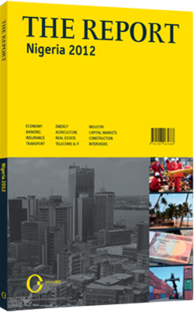Julius Berger Nigeria: Construction
THE COMPANY: Julius Berger Nigeria was first incorporated as a private limited company in 1970, but went public in1979 with shares quoted on the Nigeria Stock Exchange (NSE). The company’s principal activities cover planning, design and construction of civil engineering and building works. The company operates in the following sectors: residential and commercial construction, transport, energy and utilities (including oil, gas and water) and industrial construction. Julius Berger is vertically integrated with its own production of raw materials, such as cement and steel, and its own logistics chain. The firm maintains a high reputation for its ability to plan, design, construct and maintain a variety of civil engineering and building projects to the satisfaction of its clients. The Nigerian construction market is one of the largest in Africa, and has recorded impressive growth over the years. In addition to the heavy government spending, other factors also contributed positively to the sector’s growth. However, even with the important role the industry plays in the economic expansion, its contribution to national GDP is about 3.2%, which is quite negligible when compared with some other African countries. The Nigerian construction sector has yet to realise its full potential, especially in light of the country’s huge infrastructure deficit. Over the last three decades, the agriculture, petroleum production, and wholesale and retail sectors have recorded compound annual growth rates (CAGR) of 28%, 29% and 26%, respectively. At the same time, the construction industry’s contribution to national GDP grew at a CAGR of roughly 21% during the same period, well below its potential. It is expected that in the short term, growth in the nation’s construction activities will be stimulated by commitments from the federal and state governments to develop infrastructure and increase their participation in public-private partnership (PPP) schemes. Given Julius Berger’s strong market leadership potential, investments in critical infrastructure will further boost the revenue potential of the company in the near to long term.
1Q12 RESULTS ANALYSIS: In fiscal year (FY) 2011, turnover was slightly lower by 2.5% to N169.4bn ($1.08bn) while post-tax profits soared to N4.9bn ($31.4m), representing 73.8% year-on-year (y-o-y) growth. Improvement in operating performance boosted margins and bottom line earnings. Profits before taxes (PBT) were N10.4bn ($66.6m), up 29.7% on the N8bn ($51.2m) from the previous year. In line with the trend in its FY11 performance, turnover in 1Q12 slowed 6% to N36.6bn ($234.2m) while profits after tax (PAT) grew by 7% to N995m ($6.7m). Julius Berger’s capital structure offers considerable financial capacity for future growth. The shareholders fund grew substantially by 32% to N10.2bn ($65.3m) in 2011, while book value per share stood at N8.51 ($0.05). Trailing earnings per share increased by 75% in 2011 to N4.07 ($0.026), translating to a price to earnings ratio of 7.43x. Julius Berger remains strategically positioned to attract construction contracts across major parts of the country.
DEVELOPMENT STRATEGY: To comply with local laws and enhance its on- and offshore technical and logistical capacities, Julius Berger embarked on a number of strategic initiatives. The company incorporated two subsidiaries in 2012: PrimeTech Design and Engineering Nigeria to provide design and engineering support services; and Julius Berger Medical Services to provide medical and health care services in the company’s operations, as required by the National Health Insurance Scheme Act. Julius Berger also acquired a controlling majority stake in the incorporated entity, to which it transferred the technical and logistic business and operations of Bilfinger Berger Nigeria in Wiesbaden, Germany. This guarantees that the company controls all required services, like planning, procurement, recruitment and capacity building.
Julius Berger displays encouraging prospects for achieving economies of scale from the above integration schemes. These are complemented by the company’s special service units whereby it directly owns the production of raw materials, plants, and equipment.
You have reached the limit of premium articles you can view for free.
Choose from the options below to purchase print or digital editions of our Reports. You can also purchase a website subscription giving you unlimited access to all of our Reports online for 12 months.
If you have already purchased this Report or have a website subscription, please login to continue.

